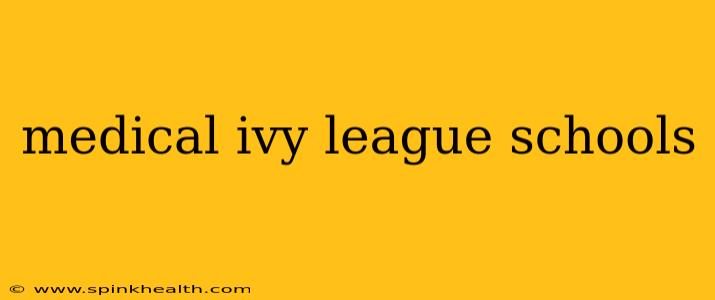Climbing the Ivy Walls: A Look at Medical Programs in the Ivy League
The Ivy League. The very name conjures images of hallowed halls, rigorous academics, and a legacy of excellence. But beyond the prestige and the history, what about the medical schools? For aspiring physicians, the Ivy League represents a pinnacle of medical education, a pathway to a career steeped in research, innovation, and patient care. But navigating the intricacies of these prestigious programs requires understanding more than just their reputation. Let's delve into the world of medical education within these eight esteemed institutions.
My journey into the world of Ivy League medical schools began with a fascination for the blend of cutting-edge research and compassionate patient care these institutions represent. I spent countless hours researching, talking to current students and alumni, and even shadowing physicians at some of these renowned hospitals. This exploration fueled my desire to share a comprehensive understanding of these exceptional medical programs.
What are the Ivy League medical schools?
The Ivy League comprises eight universities, each with its own distinct medical school:
- Columbia University Vagelos College of Physicians and Surgeons: Known for its strong ties to NewYork-Presbyterian Hospital, offering students diverse clinical experiences in a vibrant urban setting.
- Cornell University Weill Cornell Medicine: A powerhouse in biomedical research, located in the heart of New York City, and collaborating extensively with NewYork-Presbyterian Hospital.
- Dartmouth College Geisel School of Medicine: A smaller, more intimate setting in rural New Hampshire, emphasizing a strong community and primary care focus.
- Harvard Medical School: A global leader in medical research and education, boasting a vast network of affiliated hospitals and a highly competitive admissions process.
- University of Pennsylvania Perelman School of Medicine: A historically significant institution with strong ties to the University of Pennsylvania Health System, known for its innovative research and diverse clinical rotations.
- Brown University Warren Alpert Medical School: Focused on a student-centered curriculum with a commitment to community engagement and primary care.
- Princeton University (no medical school): Princeton University, while part of the Ivy League, does not have its own medical school.
- Yale University School of Medicine: Renowned for its research, particularly in areas like cancer biology and immunology, and its strong ties to Yale New Haven Hospital.
What makes Ivy League medical schools so competitive?
The intense competitiveness stems from several factors:
- Exceptional Reputation and Prestige: These schools have established themselves as leaders in medical research and education, attracting top students worldwide.
- High-Caliber Faculty: Ivy League medical schools boast renowned faculty members who are leaders in their respective fields, offering students unparalleled mentorship and learning opportunities.
- Extensive Research Opportunities: These institutions are at the forefront of medical research, providing students with ample opportunities to participate in groundbreaking studies.
- State-of-the-Art Facilities: Access to cutting-edge technology and facilities is another key draw for prospective students.
- Strong Alumni Networks: Graduates from Ivy League medical schools benefit from a vast and influential network that can open doors to countless career opportunities.
What is the acceptance rate for Ivy League medical schools?
The acceptance rate for Ivy League medical schools is exceptionally low, typically ranging from below 3% to around 5%. This makes gaining admission exceptionally challenging.
How can I improve my chances of getting into an Ivy League medical school?
Success hinges on a holistic application, incorporating stellar academics, impactful extracurricular activities showcasing leadership and commitment, strong letters of recommendation, and a compelling personal statement that highlights your passion for medicine.
What is the curriculum like at Ivy League medical schools?
Curricula vary slightly between institutions but generally involve a combination of basic sciences, clinical rotations, and research opportunities. Many incorporate problem-based learning and emphasize a strong foundation in both research and patient care.
Are Ivy League medical schools worth the cost?
The high cost of tuition is undeniable. However, the return on investment, considering the career prospects and earning potential, is often cited as a justification. The unparalleled reputation and extensive network are significant advantages throughout a physician’s career.
In conclusion, choosing an Ivy League medical school is a deeply personal decision. It requires meticulous research, self-assessment, and a clear understanding of your career goals. While the prestige and resources are undeniable, the intense competition and demanding curriculum require dedication and unwavering commitment. But for those who succeed, the rewards are immeasurable. This journey, though challenging, is ultimately one of growth, discovery, and the pursuit of a life dedicated to healing and advancing the field of medicine.

